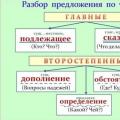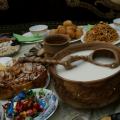Elena Sergeevna Gorcheva
Self-education plan Development of elementary mathematical concepts of preschool children through play activities
Target: Instill in children an interest in knowledge of mathematics, with the help of interesting tasks and games, make it fun for the child to learn the basics mathematicians, contribute development of attention in children, intelligence, ability to think logically, reason, draw conclusions.
Tasks:
1. Develop the child has an interest in mathematics in preschool age.
2. Introduction to subject in a playful and entertaining way.
Deadlines: academic year 2016 – 2017
Practical solution: report
Literature:
1. - T. Museinova – Candidate of Pedagogical Sciences.
2. "Sensory education"- E. Pilyugina.
3. "Let's play numbers"- series of manuals
4. « Developing perception, imagination"- A. Levina.
5. Z. A Mikhailova « Game entertaining tasks for preschoolers» - Moscow, 1990
6. E. Yu. Ivanova "100 games, scenarios and holidays"- FGUIPPV, 2004
7. V. Volina "Cheerful mathematics» - Moscow, 1999
8. Program library "Childhood" « Mathematics before school» - St. Petersburg, 2002
9. T. K. Zhikalkina « Game and entertaining tasks in mathematics» - Moscow, 1989
plan for the 2016 -2017 academic year
Implementation stages Objectives Deadlines
Preparatory Study of methodological literature
to September-October
Practical Generalization of own teaching experience activities(production and implementation of didactic games) November-April
Analytical Analysis of the created pedagogical conditions for Development May
1. Preparatory
September October
Studying literature on this topic
2. Diagnostic
November – January
"Shape and Color"
games:
"Fold item from geometric shapes" (both according to the sample and without it)
"Help Cinderella decorate her mittens" (geometric shapes)
“Pick up the key to the lock”
“Help Dunno find geometric shapes”
"Find item of the same color» (I show either a red, then a yellow, then a green circle)
"Make a chain of items of the same color» (Choose: Christmas tree, grasshopper, leaf, etc.)
3. Practical
February – April
"Quantity and Counting"
1. production and conduct of didactic games:
"Treat the Bunny"
"Make it right"
"Collect the beads"
"Hedgehogs"
"A toy shop" (many, one, equally)
"Orientation in space".
"Navigating in space"
"Tell it to your neighbor"
"Find item»
"Where is whose house?
4. Analytical
Analysis of the created pedagogical conditions for development
Working with teachers:
-"Formation elementary mathematical concepts in preschool children in various types of activities»;
-“Formation of the foundations math concepts in kindergarten»;
- « Development of mathematical abilities in preschoolers» ;
- « Mathematics and logic for older preschool children»
Working with parents:
-“How to organize games children at home using fun math material» ;
-"Cheerful math at home» ;
Exhibition design for parents: « Mathematical games and exercises for preschoolers»
Publications on the topic:
Formation of elementary mathematical concepts in preschool children through play The third year of life is a transitional period in a child’s life from early childhood to preschool age. In the third year of life, children become...
Objectives: 1. Introduce ordinal counting up to 5. 2. Learn to correctly name ordinal counting skills. 3. Strengthen counting skills. 4. Exercise.
Abstract of GCD on the formation of elementary mathematical concepts in children of senior preschool age 1. Senior preschool age 2. Cognitive activity 3. Frontal form of teaching 4. Lesson duration 30 minutes.
2.0 Development of mathematical abilities of preschoolers through play activities 2.1 Work experience Work on the development of elementary skills in children.
Teacher self-education plan “Development of mathematical abilities in early preschool children” Self-education plan for teacher Evdokimova Svetlana Nikolaevna Topic: “Development of mathematical abilities in early preschool children.
Work plan for self-education “Use of educational games in the formation of elementary mathematical concepts” WORK PLAN FOR SELF-EDUCATION of teacher of MBDOU No. 137 S. V. Agafonova for 2015-2016. TOPIC: “Use of educational games in formation.
Maryam Zulkarnaeva
Teacher’s self-education plan on the topic “Formation of elementary mathematical concepts in children of the senior group”
Subject: « Formation of elementary mathematical concepts in children of the older group through didactic games"
Development elementary mathematical concepts- This is an extremely important part of the intellectual and personal development of a preschooler. In accordance with the Federal State Educational Standard, a preschool educational institution is the first educational level, and kindergarten performs an important training function children to school. And the success of his further education largely depends on how well and timely the child is prepared for school.
Target: Increasing your theoretical level, professional skills and competence in this field topic. Mastering design methods educational-educational process.
Objectives of the professional and personal development program self-development
1. Analyze your teaching capabilities and creative potential.
2. Study educational, reference and scientific-methodological literature on this topic topic.
3. Comprehend and analyze the systemic foundations that support modern professional and pedagogical activities.
4. Summarize teaching experience in topic"for preschoolers through didactic games."
Directions self-development:
1. Study of regulatory documents.
2. Study of methodological literature.
3. Acquaintance with advanced pedagogical experience.
4. Participation in system methodological work (pedagogical council, consultations, seminars, creative groups, open viewings, mutual visits, exhibitions, stands).
5. Working with children.
6. Advanced training.
7. Work with family and society.
8. Enrichment of developmental substantively– spatial environment.
9. Certification.
Expected results:
Decor own methodological developments in information form- pedagogical modules (summarizing work experience.)
Improving teaching skills, increasing professional activity.
Development of adaptive ability in the context of modern trends in the development of education.
Perspective plan events for the 2016-2017 academic year. G.:
1. Study of regulatory documents 1. Federal Law of December 29, 2012 N 273-FZ “On Education in the Russian Federation”.
2. Order of the Ministry of Education and Science of the Russian Federation (Ministry of Education and Science of Russia) dated October 17, 2013 N 1155 Moscow “On approval of the federal state educational standard for preschool education.”
3. Order of the Russian government of December 24, 2013 No. 2506-r. Development concept mathematical education in the Russian Federation.
During the 2016-2017 academic year
Studying methodological literature, getting acquainted with advanced pedagogical experience.
1. A. Beloshistaya “Preschool age: formation and development of mathematical abilities" Preschool education-2000-№2, With. 74.
2. Vavilov, Yu. P. Games for attentive and smart. – Yaroslavl 2000. – p. 122.
3. Wenger L.A. Games and exercises to develop mental abilities in children preschool age. M: Enlightenment 1989.
4. Dyachenko O. M., Agaeva E. L. What doesn’t happen in the world? – M.: Education, 1991.
5. Mikhina E. N. "Educational games for children 2-7 years old» Volgograd: Teacher, 2013.
6. Serbina E. V. « Math for kids» / Publishing house: Moscow Enlightenment, 1992.
7. Panova E. N. “Didactic games-activities in preschool educational institutions” shopping center "Teacher", 2006
8. Erofeeva T. I. et al. "A preschooler studies mathematics. How and where?". – M., 2002.
9. Leushina A. M. "Classes on math in kindergarten» , - M.: 2005.
10. Metlina A. S. « Mathematics in kindergarten» Enlightenment, 2006.
11. Nikitin B. P. “Steps of Creativity or educational games”, Moscow, Education, 1991
12. Pozina V. A. Formation of elementary mathematical concepts, Mosaic-Synthesis, 2012. - 80 p.
13. Smolentseva, A. A. Plot-didactic games. - M.: Education, 1987. - 96 p.
14. Sorokina A.I. Didactic game in kindergarten. - M.: Education, 1982. - 98 p.
15. Stolyar A. A. “ Formation of elementary mathematical concepts in preschoolers,”– M.: 2006.
16. Joiner A. A. Let's play / M. Enlightenment, 1996.
17. Fidler M.A. « Mathematics already in kindergarten» , 3rd edition. – M., 2006.
18. Tikhomirova L. F., Basov A. V. Development of logical thinking children. /Yaroslavl. Academy of Development, 1996.
Internet resources:
http://dohcolonoc.ru;
http://nsportal.ru;
http://www.edu.ru;
http://www.detskiysad.ru;
http://www.moi-detsad.ru;
http://ivalex.ucoz.ru.
Publications on the topic:
Teacher self-education plan for the 2014–2015 academic year Self-education plan for the 2014 - 2015 academic year. 1. Consultation for newly admitted teachers “Requirements for content.
Report on teacher self-education “Development of sensory abilities of preschoolers through didactic games” I would like to share my experience on the topic “Development of sensory abilities of preschoolers through didactic games.” In 2010, I took it.
Self-education report for 2015–2016 by teacher of MBDOU No. 16 Pashina O. A.“Health-saving technologies as the basis for the development of children of senior preschool age in the conditions of the Federal State Educational Standard” Goal: formation of a comprehensive one.
Most modern young children have a general motor lag, and their fingers are also undeveloped; often small children are not.
Self-education plan “Development of speech in children of primary preschool age using finger games and exercises” Municipal budgetary preschool educational institution “Combined kindergarten No. 180” Teacher’s self-education plan.
Teacher self-education plan What makes people constantly work on themselves, expand their knowledge, and engage in self-education? To keep up with the times, teacher.
MUNICIPAL BUDGETARY PRESCHOOL EDUCATIONAL INSTITUTION
KINDERGARTEN "Batyr"
“PLAN FOR SELF-EDUCATION OF A TEACHER”
Popova Irina Viktorovna
teacher
Total experienceTeaching experience
Teaching experience in this team
Last certification date
Date of expected certification
25 years 25 years 5 years 1
2016 - 2017 academic year
senior group
Stage of work on the topic: preparatory
Start date of work on the topic: September 2016
Estimated completion date: May 2017
MUNICIPAL PRESCHOOL EDUCATIONAL INSTITUTION
KINDERGARTEN "Batyr"
PROJECT
Topic: “Development of mathematical abilities in children
preschool age through play activities"
2016
1.Introduction.
This topic is one of the complex and interesting problems of preschool education, since the foundations of logical thinking are laid in preschool childhood. In the modern world, mathematics plays a responsible role in the development and formation of an active, independently thinking individual, ready to constructively and creatively solve problems facing society. This is due to the “mathematization” and “computerization” of all spheres of human activity. Parents believe that the main goal of teaching children mathematics is to teach children to count, as well as the accumulation of minimal knowledge, for example, familiarity with numbers and geometric shapes. Parents forget that mathematics makes a great contribution to the development of logical thinking, the development of such important qualities of scientific thinking as criticality and generalization, the formation of the ability to analyze and synthesize, the ability to put forward and formulate a logical hypothesis, etc.
In preschool age, the child's leading activity is play. In this regard, taking into account the age characteristics of children, all types of activities can be carried out in the form of a game or with the content of a game situation using a character (toy). For example, the following game plots are interesting for younger preschoolers: “A trip to the forest to see a squirrel”, “Magic chest” ", "Visiting the Old Forest Man", "Three Bears", "Teremok". For older preschool children, the plots become more complex: “Space Travel”, “At the Toy Factory”, “The Kingdom of Mathematics”. Other characters come to visit the children: Pinocchio, Dunno, Ole Lukoie, The Snow Queen, etc.
. Target:
ensuring the integrity of the educational process through the organization of classes in the form of exercises of a gaming nature; promoting better understanding the essence of the issue, clarification and formation of mathematical knowledge in preschoolers; creating favorable conditions for the development of mathematical abilities; developing a child's interest in mathematics in preschool age.
Tasks:
Increase your own level of knowledge through self-education and studying methodological literature;
Organize joint activities between adults and children;
Develop a long-term plan for working with children;
Set up a “I believe” corner in the group;
Create a card index of mathematical games.
Create a math club “Entertainers”
2. Abstract part.
I assign a special role to non-standard didactic tools in the development of mathematical abilities. For preschool children, play is of exceptional importance: play for them is study, play for them is work, play for them is a serious form of education. Play for preschoolers is a way of learning about the world around them. The game will be a means of education if it is included in the holistic pedagogical process. By directing the game, organizing the life of children in the game, the teacher influences all aspects of the development of the child’s personality: feelings, consciousness, will and behavior in general. However, if for the student the goal is the game itself, then for the adult organizing the game there is another goal - the development of children, their acquisition of certain knowledge, the formation of skills, the development of certain personality qualities. This, by the way, is one of the main contradictions of the game as a means of education: on the one hand, there is no goal in the game, and on the other, the game is a means of purposeful personality formation. This is most evident in the so-called didactic games. The nature of the resolution of this contradiction determines the educational value of the game: if the achievement of a didactic goal is achieved in the game as an activity that contains the goal in itself, then its educational value will be the most significant. If the didactic task is solved in game actions, the purpose of which for their participants is this didactic task, then the educational value of the game will be minimal.
A game is valuable only if it contributes to a better understanding of the mathematical essence of the issue, clarification and formation of students’ mathematical knowledge. Didactic games and play exercises stimulate communication, since in the process of these games the relationships between children, child and parent, child and teacher begin to be more relaxed and emotional.
3. Design part.
№Stages of work
Events
Dates
Theoretical
Studying scientific and methodological literature;
review of information on the topic under study on the Internet
September 2016 – May 2017
Practical
Development of lesson notes for children
September
2016 – 2017
Design in the group “I believe”
October 2016
Creating a card index of mathematical games
November 2016
Preparing material for the circle
September 2016
May 2017
Prepare a collection of consultations for parents “Development of mathematical abilities in older preschoolers”
December 2016
Theme output:
Conducting open classes. Topic: “Adventure in the Number Glade” (May 2017)
Design of a card index of mathematical games.
Collection of consultations for parents. Topic: “Development of mathematical abilities in older preschoolers.”
Design of the moving folder “Mathematics for preschoolers”
Report on the work done for the academic year.
4. Conclusion.
Self-education work plan
Educator
Zhuikova Inna Anatolyevna
Preparatory group
"Why Chicks"
MDOU d/s "Smile"
Subject: “Working with parents on FEMP”
Target: development of interest in the subject of mathematics, based on cognitive activity and curiosity.
Tasks: Educational. To promote the development of the ability to apply mathematical knowledge in non-standard practical problems.
Developmental . Develop mental operations: analogy, systematization, generalization, observation, planning.
Educational. Help maintain interest in mathematics and develop the ability to work in a team.
Literature:
1 “Rainbow” program edited by M.A. Vasilyeva, V.V. Gerbova, etc.
2. Cheplashkina I. N. Mathematics is interesting. St. Petersburg: Detstvo-press, 2006.
3. Smolentseva A. A., Suvorova O. V. Mathematics in problem situations for young children. St. Petersburg: Detstvo-press, 2004.
4.A. Beloshistaya “Preschool age: the formation and development of mathematical abilities.” Preschool education-2000-No. 2, p. 74.
| Plan Section | Deadlines | Form of work | Practical outputs (abstracts, reports, open viewing, exhibitions of works, etc.) |
| September | Parent meeting “Tasks for the academic year” | Questionnaire on FEMP |
|
| October | Questionnaire By FEMP Conversation"Fun activities at home FEMP» | Help parents in the production of educational games DIY FEMP. |
|
| November | Consultation For parents "Math Games" Project“And the country is beautiful and strong in mathematics” | mathematical KVN. |
|
| December | Consultation For parents “Why do children need mathematics?” Performance at the teachers' council "working with parents on FEMP" | Release of the wall newspaper “And the country is beautiful and strong in mathematics” |
|
| January | Parent meeting "Didactic games in mathematics" | Exhibition of creative works“Fun shapes” (crafts made from geometric shapes). |
|
| February | Thematic consultation “Right and left. How to teach a child not to confuse sides" | Composing a fairy tale “About numbers” |
|
| March | Consultation forparents "The role of d/i on famp for children» | Exhibition of children's drawings in collaboration with parents"magnitude" |
|
| April | Information forparents to the parent corner "Fun Math" | Participation parents in a photo exhibition"Learning math at home" |
|
| Parent meeting"Results of the year" | Release of the wall newspaper “The Way We Were” |
Full name of the teacherFilimonova Elena Anatolyevna Date of birth: 01/26/1987 Education (when and what educational institution graduated from):2009, Higher professional education. State educational institution of higher professional education "Elabuga State Pedagogical University", Diploma specialty:Educational psychologist, teacher of correctional pedagogical activities, specialty “Pedagogy and Psychology” Place of work: MBDOU "Kindergarten No. 17 of Leninogorsk" MO "LMR" Position held: teacher Date of appointment: 08/12/2012 Total work experience: 8 years Teaching experience: 7 years Refresher courses:“Modern approaches to the organization of educational activities that ensure the implementation of the Federal State Educational Standard of Education” in the amount of 72 hours at the Volga Interregional Center for Advanced Training and Professional Retraining of Education Workers of the Institute of Psychology and Education of the Federal State Autonomous Educational Institution of Higher Education “Kazan (Volga Region) Federal Institute” Retraining courses:“Pedagogy and psychology of preschool education” Institute of Economics, Management and Law (Kazan). Duration of training: October 24, 2014 - March 16, 2015. |
||||||||||||||
SELF-EDUCATION PLAN
MBDOU No. 17 is working on the problem:Study and implementation in the educational process of the Federal State Educational Standard of Preschool Education
Self-education topic:“Development of basic mathematical abilities in preschool children through innovative technologies”
Target: Creating conditions for preschoolers to master mathematical concepts will ensure the successful development of children’s abilities and thinking.
Tasks :
1.develop interest in mathematics in preschool children;
2. develop children’s skills to independently use acquired knowledge in various activities, involve peers in extensive games;
3. to form parents’ interest in the achievements of their children in joint activities with them;
4.promote the development of mental operations (analysis, synthesis, comparison, classification, logical thinking)
Participants:
- Children
- Parents
- Teachers
List of questions for self-education:
- study of psychological and pedagogical literature;
- development of software and methodological support for the educational process;
- project and research activities;
- analysis and evaluation of the results of one’s activities and the activities of children;
- continue to study the teaching experience of other teachers;
- planned and systematic improvement of methods of the educational process.
Relevance:
The subject of mathematics is so serious
That we must not miss an opportunity,
Make it entertaining
B. Pascal
Preschool age is the beginning of the comprehensive development and formation of a child’s personality. During this period, children experience intensive physical, mental, as well as cognitive and intellectual development. The formation of mathematical concepts is a powerful means of intellectual development of a preschooler, his cognitive powers and creative abilities. Parents and us teachers are always concerned with the question of how to ensure the full development of a child in preschool age, how to properly prepare him for school. One of the indicators of a child’s intellectual readiness for school is the level of development of mathematical and communication abilities.
Teaching preschoolers the basics of mathematics is currently given an important place. This is caused by a number of reasons: the beginning of schooling at the age of six, the abundance of information received by the child, increased attention to computerization, the desire to make the learning process more intensive, the desire of parents in this regard, to teach the child to recognize numbers, count, and solve problems as early as possible .
The practice of preschool education shows that the success of learning is influenced not only by the content of the material offered, but also by the form of its presentation, which can arouse the child’s interest and cognitive activity. I am sure that knowledge given to children in an entertaining form is absorbed faster, more firmly and easier than that presented with dry exercises. It is not without reason that folk wisdom created a game that is the most suitable form of learning for a child. With the help of didactic games and tasks for ingenuity, ingenuity, and joke tasks, we clarify and consolidate children’s ideas about numbers, the relationships between them, geometric figures, time and space relationships. Game situations with elements of competition, reading passages of fiction motivate children and direct their mental activity to find ways to solve problems.
Using entertaining mathematics, we put preschoolers in search conditions, awaken an interest in winning, therefore, children strive to be fast and resourceful. I believe that teaching children mathematics in preschool age contributes to the formation and improvement of intellectual abilities: logic of thought, reasoning and action, flexibility of the thought process, ingenuity and ingenuity, and the development of creative thinking.
Expected result:
1. Expanding children's knowledge about entertaining mathematical material.
2. Ability to analyze work.
3. Activating the cognitive activity of students by involving them in independent searches for solving thematic problems.
4. Formation of a positive attitude towards work.
5. Increasing the level of self-education through studying literature, Internet information resources and the experience of colleagues.
6. Encouraging parents to participate in joint creative activities.
7.Development of creativity, initiative, independence in the process of productive activities.
8.Formation of the ability for self-learning, self-development, self-expression.
Form of report on the work done:Presentation of the work done and photo report, open events together with parents.
Self-education form:(individual, group, collective)




